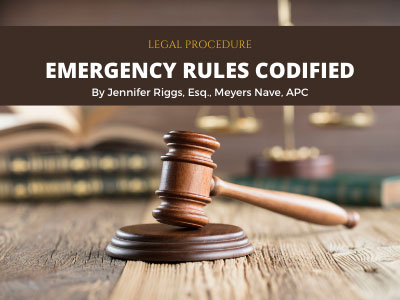
By Jennifer Riggs, Esq., Meyers Nave, APC
Some of the changes that the pandemic has brought are likely to stay for a while. On the legal front, the Judicial Council passed a number of “emergency” rules early in the pandemic, intended to keep cases moving forward even as we all navigated the ways we could work remotely. Recently the Legislature adopted some of those emergency rules, adding them to the Code of Civil Procedure and making these changes part of our regular practice. Specifically, new rules now allow for remote depositions to take place and make it easier to serve documents electronically.
Emergency Rule 11 allowed depositions to be conducted remotely. That rule is now codified at Code of Civil Procedure § 2025.310 (“Attendance via remote means”). Under this new section of the Civil Discovery Act, “any party or attorney of record may, but is not required, to be physically present at the deposition at the location of the deponent.” (Code Civ. Proc. § 2025.310 (b).) In addition, the court reporter may also attend the deposition remotely, “[a]t the election of the deponent or the deposing party,” and the deponent may be sworn remotely as well. (Code Civ. Proc. § 2025.310 (a).) Although depositions may go forward remotely, the other rules in the Civil Discovery Act “including, but not limited to, provisions regarding the time, place, or manner in which a deposition shall be conducted” remain in place. (Code Civ. Proc. § 2025.310 (d).) The rules to implement this section can be set by the court in each action or may be set in the California Rules of Court.
We anticipate that there may still be disputes over remote depositions, in part because there are differences and limitations in a remote deposition that require a different kind of planning. Deposition exhibits, for example, must be handled in a new way. During an in-person deposition, typically hard copies of documents are handed out, and the court reporter marks each exhibit with an official stamp or sticker. In a remote deposition, where participants are not in the same room, handing out hard copies cannot happen. To address this issue, some parties have adopted a policy of sharing deposition exhibits before the deposition begins, to make it easier to move through documents while the deposition is in progress. This can include, for example, shipping hard copies to each party and the court reporter before the day of the deposition; or uploading them to a secure site so that each participant can download a set, also before the deposition. Other parties simply share the documents onscreen during the deposition itself, and then upload them to a document sharing platform either during or after the deposition. In either case, parties must prepare differently for a remote deposition than for an in-person deposition. The new section authorizing remote depositions leaves much of the procedural detail for the parties to negotiate.
Although California had been moving closer to allowing e-mail service of documents, Emergency Rule 12 authorized electronic service on represented parties. That rule has now been codified at Code of Civil Procedure § 1010.6 (e). Once a represented party has appeared in an action and provided an email address, electronic service on that party is authorized for “any notice or document that may be served by mail, express mail, overnight delivery, or facsimile transmission.” (Code Civ. Proc. § 1010.6 (e)(1).) But before serving that party the first time, “the serving party shall confirm by telephone or email the appropriate electronic service address for counsel being served.” (Code Civ. Proc. § 1010.6 (e)(1).) Parties previously could agree to electronic service but did so on a case by case basis. The adoption of this new rule allows a more efficient and standardized process for electronic service. In a time when many law offices have shifted to remote work, the ability to get documents served electronically is helpful.
With the addition of these two new sections in the Code of Civil Procedure, Emergency Rules 11 and 12 have been repealed but the new practices that they ushered in remain. Even after the pandemic ends, electronic service and remote depositions are here to stay.
Categorized in: Legal Procedure
| << previous | next >> |








